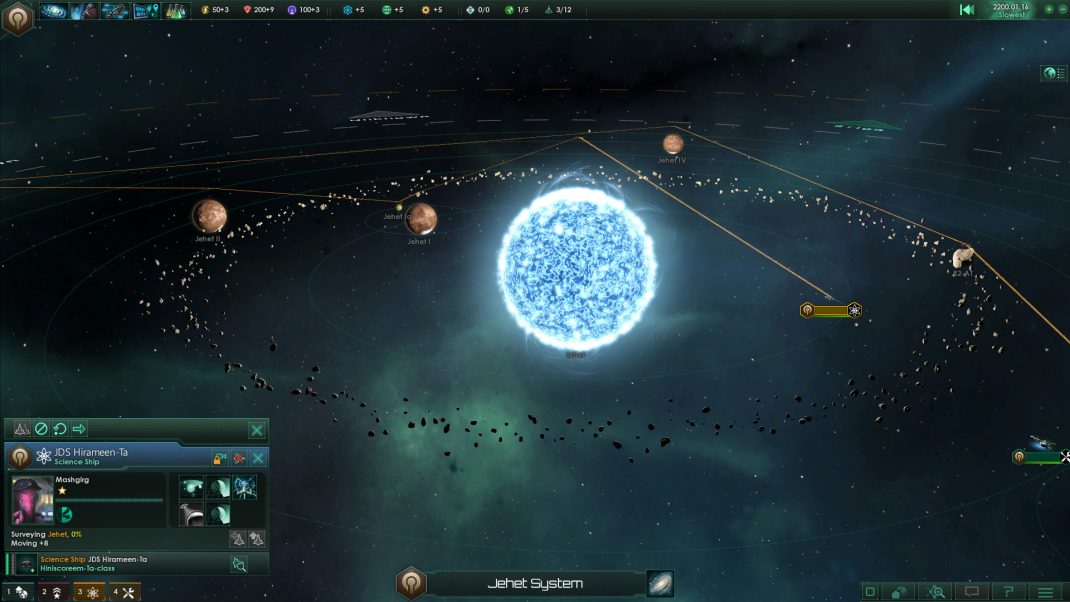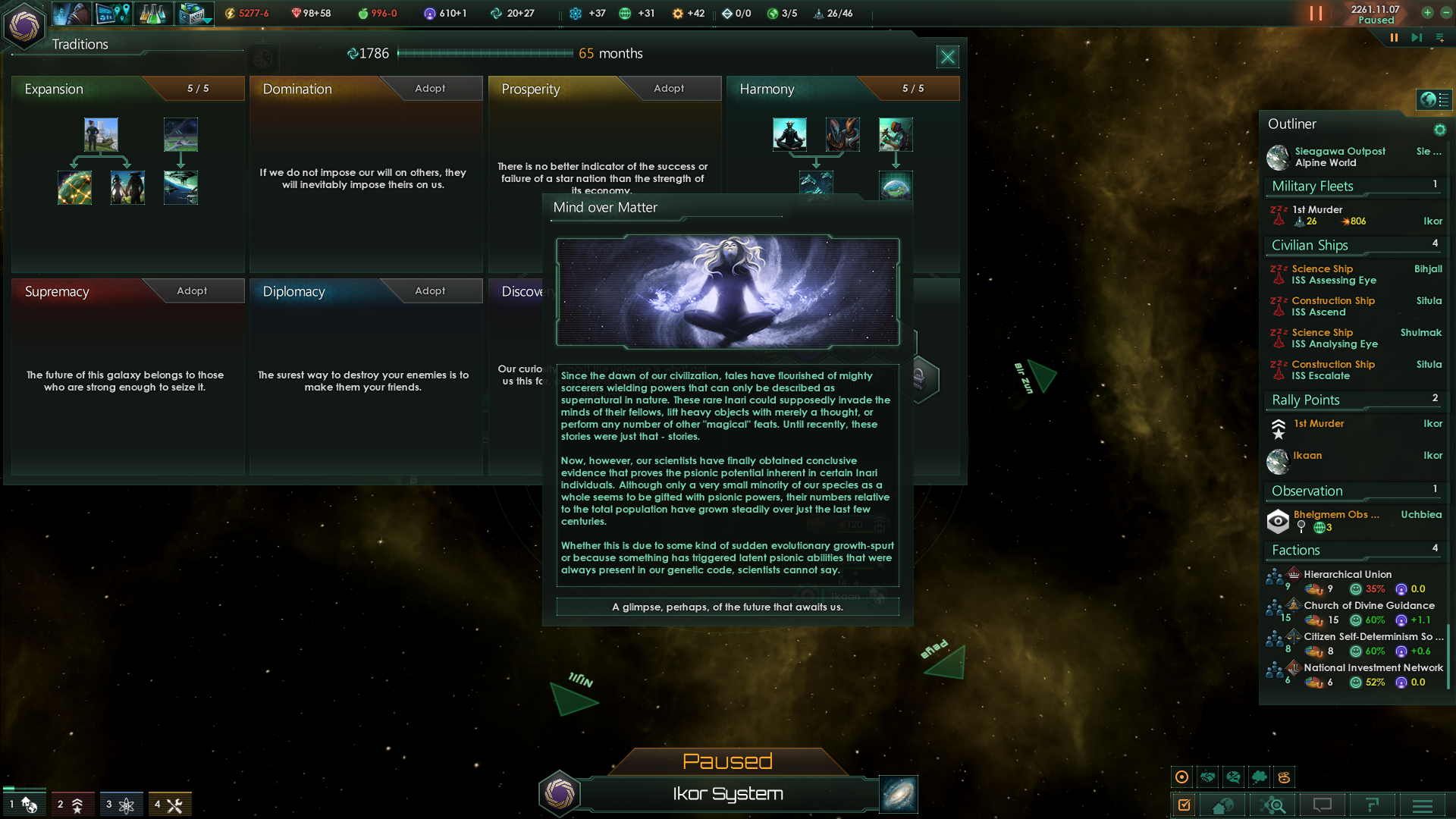
Stellaris Utopia Expansion
Paradox interactive
Space 4X games have been one of my favorite gaming genres for a long time now. Ever since I played Master of Orion 2. MOO2 had a certain magic about it that I really haven’t seen duplicated since its debut way back in 1996.
The only game that came close to being as addictive as MOO2 was Stardock’s 2008 4X space strategy game, Sins of a Solar Empire. I poured countless hours into SOASE, its subsequence DLCs, and its successor, SOASE Rebellion. However, after a while, the SOASE series began to become less and less interesting to me. I suppose the beginning of this started when a friend (whom I’d duped into buying it so that we could multiplay together) said: “You can’t even customize or build your own ships?” I think he was onto something there. Oh, and the three civilizations you had to choose from were pretty much cardboard cutouts which couldn’t be altered in anyway, save for technological research paths.
Stardock’s other major space game, Galactic Civilizations III, was fun for a while, and you could build your own custom races, but it grew sort of stale eventually. One of the main things that bothered me about GalCiv III was that there were no administrators which you could assign to planets or space stations, nor were there any admirals to head up your fleets (although it seems that Stardock will be addressing that in their next DLC).

Then Paradox Interactive dropped its science fiction 4X title Stellaris upon the gaming masses last year, literally out of nowhere it seemed. However, I must have been one of the only ones in the dark about it since it quickly became Paradox’s fastest selling game, ever.
What I really liked about Stellaris is its emphasis on exploration, at least in the early game. I also appreciated how long it took to even get your first colony settled. In other 4X space games, you could literally have planetary colonies set up within five minutes of gameplay. In Stellaris, you had to wait until you could actually afford a colony ship (they’re rightfully expensive) and then they took a full year to build (luckily in game time) so we’re usually talking about at least a half an hour to do so.
One of major critiques of Stellaris was that its mid-game seemed to taper off and became more or less aimless. And although Paradox has tried to address this in updates and a story pack titled Leviathans, it really needed a full-fledged expansion to address this issue. Well, evidently Paradox was listening because its first major expansion, Utopia, is upon us, and boy is it indeed stellar.

One of the first things that I noticed about the expansion’s changes was that I couldn’t just start a game with my saved civilization. That’s because one of the first additions to the game are Civics. You are now free to choose what type of philosophies with which your government operates, and that will further individualize it based on what type of Authority and Ethics it embraces.
But it doesn’t stop there. Although civics choices show up in the early game, two additional new factors, Traditions and Ascension Perks, make their appearances during the mid-game. Traditions encompass such things as Harmony, where your civilization strives to work towards a common good, or Expansion, which gives bonuses to your colonial endeavors, and so forth and so on. These in turn can lead to the mighty Ascension Perks, which are harder to develop.

Ascension Perks can deliver huge payoffs and can even change a game’s victory conditions. You can now learn the ways of the machine and turn your entire civilization into cyborgs or even full-on robots, ascend to a different plane as telepaths with psionic powers, or transform them into genetically altered super-beings. There’s even an option for making your faction operate as a singular Hive Mind. In all, Civics, Traditions, and Ascension Perks all work to further individualize each stellar nation, and they are very welcome additions.
You can also now dictate how your civilization will treat slave populations. You can give them certain rights, turn them into battle thralls, or you can go the Soylent Green route and turn them into food. The universe is now also very dynamic when it comes to interstellar refugees looking for safe havens, and you can determine how your people will react to them. Will you recklessly take them all in, allow limited numbers, or shun them altogether?

Habitat Stations also make it viable to be a powerful force in the universe while not necessarily possessing the most territory. That’s because these stations allow you to “build tall” instead of expand outwards—meaning you are basically building immense, artificial worlds with which to house your ever growing populations. This makes it even more crucial to gather intel on your enemies since you can’t just gauge their relative military strength merely based on how large or small their territories are.
The late-game has also been given a much needed shot in the arm with the addition of Megastructures. These gigantic constructs take huge amounts of resources to erect, and copious amounts of time as well. This makes for an interesting dilemma. Should your civilization sacrifice early on and only field a smaller, defensive fleet so that you could begin construction of one of these immense projects? Or perhaps forgo them entirely and have a larger, more aggressive navy? Combined with the Leviathan story pack’s War in Heaven, and gigantic space monsters roaming around, and the late-game can become very active indeed.

Utopia is what Stellaris needed in order to make it much more of a complete game. It offers lots of additional civilization customization and individuality, different types of victory conditions, and more mid and late-game content. Now if only we could get espionage systems integrated into diplomacy, and maybe energy-based (lava planets and gas giants?) and aquatic beings (aquatic worlds?). But as it stands, what a brilliant expansion Utopia is.
SCORE: 91%
Stellaris Utopia Expansion offers some excellent visuals that suit its futuristic theme. However, you have to have a fast gaming PC or gaming laptop in order to play it at a decent framerate. So, you may just want to invest in a decent gaming rig:

Visit CyberpowerPC’s website to check out all of the other great deals as well!